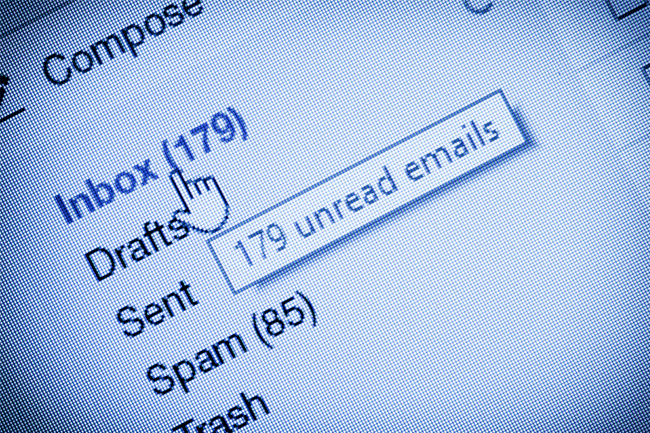
CYBER SECURITY | 2 MIN READ
As a Managed Service Provider that sets up clients with email archiving solutions, we have prospects and customers alike that ask for tips on data security and email best practices. Email archiving is a software we recommend that optimizes your inbox for data security, productivity, and efficiency. Keep reading to learn what email archiving is, why you should archive your emails, and more.
Not enough time? Jump to:
What is Email Archiving?

Email archiving is the process of flagging and storing important emails in a separate archived inbox. This can be completed manually or automatically using software.
Email archiving indexes and stores the original version of sent and received messages, including all related email attachments.
Once emails are stored in the separate inbox, they can be searched for easily by date, contact, keyword, and more.
Keep in mind that email archiving is a separate process from email and data backups. Data backups repeatedly save all data available in a moment in time for the purposes of disaster recovery. However, in the long-term, archiving is a solution that
Why Should I Archive my Emails?
The purpose of email archiving is to separately store important emails that you no longer need direct access to in a secure location.
Records Management
A single employee's inbox can quickly become clogged with hundreds or thousands of unread emails, and this number only increases for those in executive positions.
Important emails can swiftly be buried among these unread emails. By moving them to a separate location, these emails are quickly accessible for when they're needed.
This process is especially beneficial for audits, investigations, and compliance with any data regulations that have file storage requirements such as Sarbanes Oxley in the legal industry.
Data Security
In the event of a network outage or cyber attack, your business could lose access to sensitive data that hasn't been backed up.
As a part of a comprehensive Backup Continuity and Disaster Recovery (BCDR) plan, email archiving can be used to safeguard against data loss by saving important emails in multiple locations.
Additionally, when employees accidentally delete important emails or move jobs, emails can easily get permanently lost. Email archiving ensures that these emails will always be accessible by taking human error out of the equation.
RELATED: BCDR Plans: Why All Businesses Should Have Them
What Happens to my Emails When They're Archived?
When your emails are archived, they're moved to a separate location and sometimes immediately deleted from the original inbox. This automated deletion can free up space on your email server, which can help one comply with storage maximums on email servers.
Benefits of Email Archiving

Regulatory Compliance
Industries subject to data privacy regulatory compliance, such as the legal and healthcare industries, must follow data storage procedures to maintain compliance.
For instance, HIPAA requires those in the healthcare industry to store records for at least six years. To comply with Sarbanes Oxley in the legal industry, firms have to store records for longer.
Industries such as these can use email archiving, a long-term storage solution, to comply with data storage requirements.
Email archiving features also ensure regulatory compliance by showing a tamper-proof log of who reads which archived emails and when. Features like this can identify users who have viewed sensitive information that they shouldn't have access to, which can minimize data privacy regulatory violations.
RELATED: Can Businesses Be Sued for Data Breaches?
Productivity
Instead of wasting time searching your entire inbox, which can quickly become inefficient with the limited range of search filters available with major email providers, you can utilize email archiving to find the emails you want with ease.
Some archiving solutions come with additional email search filters such as attachment name and words within documents, which further reduces the time it takes to find emails you need.
Additionally, automated deletion of archived emails means that you no longer have to waste time going through older emails and deleting them to free up limited inbox space. Optimized email server space can improve server performance as well, since clogged servers can begin running slowly.
Fast Disaster Recovery
As previously mentioned, email archiving can be used as a part of a holistic Backup Continuity and Disaster Recovery plan to ensure long-term storage of the emails that matter most.
However, email archiving not only assists in backup recovery but shortens the process. This is because archived data can take up less space than data backups.
Protection Against Human Error
While computers are built to be perfect, humans aren't. Emails can accidentally be deleted, and malicious actors can purposely delete sensitive or important information.
Email archiving mitigates these risks by storing important emails in another secure location.
Tamper-proof archive logs ensure that malicious actors who view sensitive archived emails are quickly identified.
Data Security
Email archiving solutions are layered with data backup and disaster recovery capabilities. This maximizes secure long-term storage of sensitive and important information.
Archived emails are moved to a secure off-site server or cloud environment, which reduces the chances of a cyber criminal accessing these emails by hacking your office's network.
Additionally, some email archiving providers, such as the one that we partner with, sell additional email security products, which means that you can use them as a one-stop shop to maximize productivity and data security for your business.
RELATED: What is Email Filtering and How Does it Work?
Email archiving helps businesses maximize productivity and data security. Use this article to start a conversation within your organization surrounding email optimization.
For more IT-related content, follow our blog!
Posted by
Tech Support

